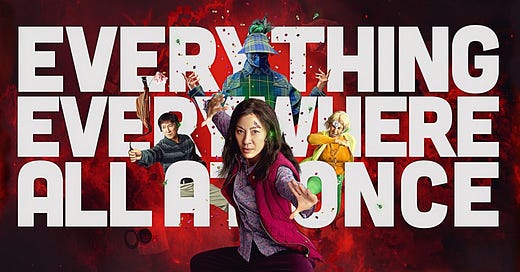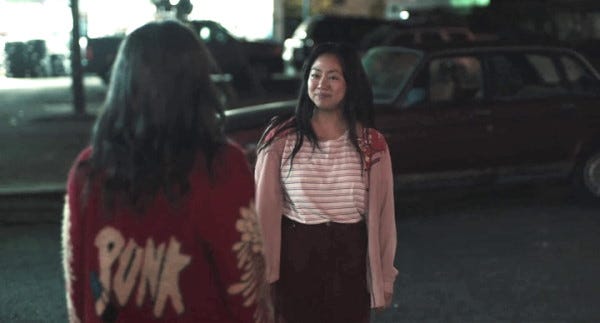I set out this January to do something I’d never done before, watch all the Best Picture Nominees for this year. I knew I wouldn't complete the task. For one, I didn't have enough time, and second, you couldn’t pay me enough to watch Elvis (Wait! Those of youth know me know that you could pay me enough).
Anyway, with my hiatus from social media in full swing, one place I’ve found myself is enjoying more and more movies, music, and novels. This weekend, along with our Sacred Frames Lenten Group at Ecclesia, I watched Everything Everywhere All At Once (EEAAO). Later that same night, EEAAO virtually swept the SAG Awards.
EEAAO is about many things, both on and off the screen. The movie itself is about fracture, belonging, regret, family, parental wounds, young love, aging love, disillusionment, meaning, success, and overcoming of both the world and self. This smorgasbord of concepts is one reason the movie is so long, while also being the reason so many people find EEAAO so resonant. There is something for everyone everywhere.
What I find myself thinking about is possibility. In EEAAO, introduces viewers to a multiverse, an infinite number of universes were different decisions and play themselves out. A multiverse creates infinite possibilities.
I believe in possibility, that no decision is our last, that human beings have surpassing abilities to shape their own destiny and, while disappointment is often right and necessary, beginning again is only a sunrise away.
My church often hears me say “God’s mercies are new every morning.” I believe this in my core. I have to.
I have simply made too many slip-ups, mistakes, and sins to wake up tomorrow if this were not true. Everyone morning when I wake-up I tell myself, “Make decisions today that you’ll be proud of tonight.” And when I go to bed, I ask whether or not my decisions — from eating to exercise to words I say and how I do or don’t spend my time — lived up to those intentions. When I am unsatisfied with my answers I gently say, “God’s mercies are new every morning.”
People often see religion — particularly American Christianity — as so pietistic that it is reflexively condemning and judgmental. I get it. There are, and have always been, enough Christians in the world to give justifiable rise to that opinion. But that is not the Christianity in Scripture.
EEAAO presents a multiverse where anything is possible and relationships can begin again, but it never really says why that might be important, other than our feels. It offers a progressive vision of the world, wherein the underlying tasks of life is simply “do better.”
As much as I like the idea of doing better, human beings have a terrible history of doing better. War, sexism, murder, slavery, marginalization, and all the rest of humanities history of horrors are still with us.
What humans do better than doing better is reciprocation. This is why the continual invitation in the Scriptures is for the people of God not to “do better,” but rather to treat others as God has treated them. Meaning: If God offers us new mercies every morning, this should be our posture to the world around us.
Mercy.
Everyday.
New Mercy.
Perhaps this is the reason Jesus and the disciple place mercy over judgment and sacrifice. Mercy is the what we need, not just from God, but from one another.
Mercy toward your partner. Mercy toward your parents. Mercy toward your children. Mercy in your politics. Mercy toward your co-workers. Mercy toward…yourself.
Perhaps your challenge today, and tomorrow, and the day after tomorrow, is simply to be a person of mercy. And we offer mercy not because the recipient deserves it, but because we need it and because we have been given it.





